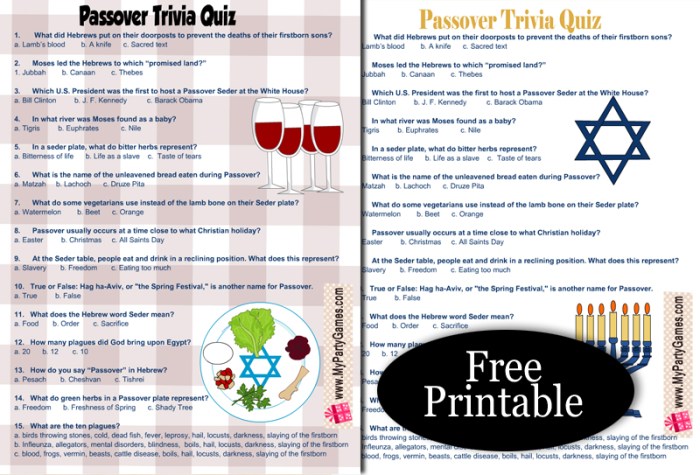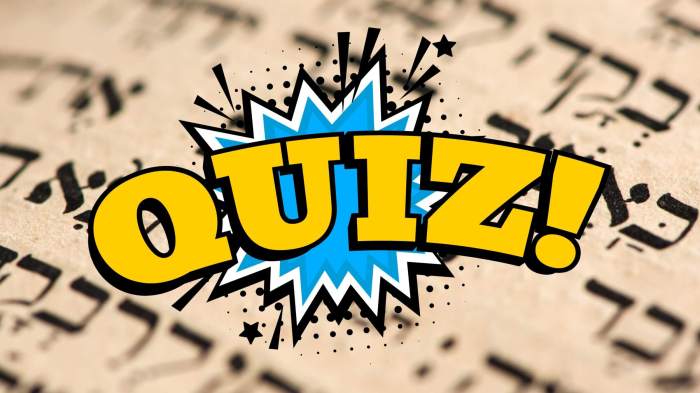Jewish trivia questions and answers – Welcome to the fascinating world of Jewish trivia! Dive into a comprehensive exploration of Jewish history, culture, religion, and identity through engaging questions and answers. From the origins of Judaism to the impact of the Holocaust, from unique customs to the role of rabbis, this guide unveils the rich tapestry of Jewish life.
Jewish History: Jewish Trivia Questions And Answers

Jewish history is a rich and complex tapestry of events, spanning thousands of years and encompassing a diverse range of cultures and traditions. The Jewish people have made significant contributions to civilization, including advancements in religion, philosophy, science, and the arts.
Origins and Development of Judaism
The origins of Judaism can be traced back to the patriarch Abraham, who lived in Mesopotamia around 2000 BCE. Abraham is believed to have been the first person to recognize the one true God, and his covenant with God formed the basis of the Jewish faith.
Judaism developed over time, with the giving of the Torah (the first five books of the Hebrew Bible) to Moses on Mount Sinai around 1300 BCE being a pivotal event. The Torah contains the laws and commandments that govern Jewish life, and it has served as the foundation of Jewish religious practice for centuries.
Timeline of Key Events in Jewish History
*
-*c. 2000 BCE
Abraham, the patriarch of the Jewish people, is born in Mesopotamia.
-
-*c. 1800 BCE
The Israelites, descendants of Abraham, settle in Egypt.
-*c. 1300 BCE
Moses leads the Israelites out of Egypt and receives the Torah on Mount Sinai.
-*c. 1000 BCE
King David establishes the United Kingdom of Israel.
-*922 BCE
The United Kingdom of Israel is divided into the kingdoms of Israel and Judah.
-*586 BCE
The Babylonians conquer the kingdom of Judah and destroy the First Temple in Jerusalem.
-*538 BCE
The Persians conquer Babylon and allow the Jews to return to Jerusalem and rebuild the Temple.
-*332 BCE
Alexander the Great conquers Judea.
-*63 BCE
The Romans conquer Judea.
-*70 CE
The Romans destroy the Second Temple in Jerusalem.
-*135 CE
The Bar Kokhba revolt against Roman rule is crushed, and the Jews are exiled from Judea.
-*1096 CE
The First Crusade begins, leading to widespread persecution of Jews in Europe.
-*1492 CE
The Jews are expelled from Spain.
-*1654 CE
The Jews are readmitted to England.
-*1881 CE
Pogroms against Jews begin in Russia.
-*1933 CE
The Nazis come to power in Germany and begin to persecute the Jews.
-*1941-1945 CE
The Holocaust, in which approximately six million Jews are murdered by the Nazis.
-*1948 CE
The State of Israel is established.
The Holocaust and Its Impact on the Jewish People
The Holocaust was a systematic genocide of the Jewish people carried out by the Nazis during World War II. The Nazis murdered approximately six million Jews, or two-thirds of the Jewish population of Europe. The Holocaust was a horrific event that had a profound impact on the Jewish people.
It led to the loss of millions of lives, the destruction of Jewish communities, and the trauma of survivors. The Holocaust is a reminder of the dangers of hatred and intolerance, and it is a testament to the resilience of the Jewish people.
Jewish Culture

Jewish culture is a vibrant and diverse tapestry of customs, traditions, holidays, festivals, art, music, and literature. It has been shaped by centuries of Jewish history and the unique experiences of Jewish communities around the world.
Customs and Traditions, Jewish trivia questions and answers
Jewish customs and traditions play a vital role in shaping Jewish identity. They include dietary laws (kashrut), religious observances (mitzvot), and life-cycle events (such as circumcision, bar/bat mitzvah, and marriage). These customs and traditions help to create a sense of community and belonging among Jews and serve as a way to connect with their heritage.
Holidays and Festivals
Jewish holidays and festivals are an integral part of Jewish culture. They commemorate important events in Jewish history and provide opportunities for celebration and reflection. Some of the most important holidays include Rosh Hashanah (the Jewish New Year), Yom Kippur (the Day of Atonement), Passover, Shavuot, and Sukkot.
Music, Art, and Literature
Jewish music, art, and literature have made significant contributions to world culture. Jewish music is known for its rich melodies and rhythms, and has been influenced by a variety of musical traditions. Jewish art often depicts religious themes and has been used to decorate synagogues and other Jewish buildings.
Jewish literature is a vast and diverse field that includes works of fiction, non-fiction, poetry, and drama.
Jewish Religion
Judaism is the monotheistic religion of the Jewish people. It is one of the oldest religions in the world, with its origins dating back to the Bronze Age.
The basic beliefs of Judaism include:
- Belief in one God
- Belief in the Torah as the revealed word of God
- Belief in the coming of the Messiah
The basic practices of Judaism include:
- Prayer
- Study of the Torah
- Observance of the Sabbath
- Keeping kosher
Denominations of Judaism
There are several different denominations of Judaism, including:
- Orthodox Judaism
- Conservative Judaism
- Reform Judaism
Orthodox Judaism is the most traditional form of Judaism, and its adherents believe that the Torah is the literal word of God. Conservative Judaism is a more moderate form of Judaism, and its adherents believe that the Torah is the inspired word of God.
Reform Judaism is the most liberal form of Judaism, and its adherents believe that the Torah is a product of human experience.
Role of Rabbis and Other Religious Leaders
Rabbis are the religious leaders of Jewish communities. They are responsible for teaching the Torah, leading prayer services, and providing spiritual guidance to their congregations. Other religious leaders in Jewish communities include cantors, who lead the singing of prayers, and mohels, who perform circumcisions.
Jewish Identity

Jewish identity is a complex and multifaceted concept that has been shaped by centuries of history, culture, and religion. There is no single definition of Jewish identity, as it varies depending on individual experiences, beliefs, and practices. However, there are some common threads that run through the many different ways that Jewish people define their identity.
One of the most important aspects of Jewish identity is a sense of belonging to a community. Jewish people have a long history of living in close-knit communities, and this sense of community remains an important part of Jewish life today.
Jewish communities provide support, socialization, and a sense of belonging for their members.
Another important aspect of Jewish identity is a commitment to social justice. Jewish tradition places a great emphasis on helping the poor and needy, and many Jewish people are involved in social justice work. This commitment to social justice is often seen as an extension of the Jewish belief in the equality of all people.
Jewish identity is also often expressed through religious observance. Jewish people have a wide range of beliefs and practices, but they all share a common commitment to the Torah, the central religious text of Judaism. Religious observance can take many different forms, from daily prayer to weekly synagogue attendance to observance of Jewish holidays.
Jewish identity is not static, but rather something that is constantly evolving. As the world changes, so too does the way that Jewish people define their identity. However, the core values of community, social justice, and religious observance remain at the heart of Jewish identity.
Challenges and Opportunities Facing Jewish People in the Modern World
Jewish people face a number of challenges in the modern world, including anti-Semitism, assimilation, and the rise of secularism. Anti-Semitism is a persistent problem that has plagued Jewish people for centuries, and it continues to be a threat today. Assimilation is another challenge that Jewish people face, as they increasingly integrate into the broader society.
This can lead to a loss of Jewish identity and culture.
Despite these challenges, Jewish people also have a number of opportunities in the modern world. Jewish communities are thriving in many parts of the world, and Jewish culture is flourishing. Jewish people are also making significant contributions to society in a wide range of fields, including science, medicine, and the arts.
Contributions of Jewish People to Society
Jewish people have made significant contributions to society in a wide range of fields, including science, medicine, the arts, and business. Some of the most famous Jewish scientists include Albert Einstein, Marie Curie, and Jonas Salk. Jewish doctors have also made major contributions to medicine, including Sigmund Freud, who is considered the father of psychoanalysis.
In the arts, Jewish people have made significant contributions to music, literature, and film. Some of the most famous Jewish musicians include Bob Dylan, Leonard Cohen, and Barbra Streisand. Jewish writers have also made major contributions to literature, including Franz Kafka, Saul Bellow, and Philip Roth.
In business, Jewish people have been successful in a wide range of industries, including finance, retail, and technology. Some of the most famous Jewish businessmen include Warren Buffett, Michael Bloomberg, and Mark Zuckerberg.
Essential Questionnaire
What is the significance of the Star of David in Jewish culture?
The Star of David, also known as the Magen David, is a symbol of Judaism and Jewish identity. It is composed of two overlapping triangles, representing the union of the physical and spiritual realms.
Who was the first rabbi in Jewish history?
The concept of a rabbi as a spiritual leader and teacher emerged during the Second Temple period. One of the earliest known rabbis was Hillel the Elder, who lived in the 1st century BCE.
What is the name of the Jewish New Year?
The Jewish New Year is called Rosh Hashanah, which means “head of the year.” It marks the beginning of the High Holy Days and is a time for reflection and repentance.